100% Valid 70-411 Exam Pass Tips: PassLeader’s 447q 70-411 exam dumps were updated in recent days with new 70-411 exam questions added, PassLeader ensure the latest 70-411 VCE dumps or 70-411 PDF dumps are the newest and the most valid, our 70-411 practice tests will help you 100 percent passing 70-411 exam. Visit passleader.com and get the 70-411 exam questions with PDF and VCE. New version VCE simulator is also free now.
keywords: 70-411 exam,447q 70-411 exam dumps,447q 70-411 exam questions,70-411 pdf dumps,70-411 vce dumps,70-411 study guide,70-411 practice test,Administering Windows Server 2012 R2 Exam
P.S. Download Free 70-411 PDF Dumps and Preview PassLeader 70-411 VCE Dumps At The End Of This Post!!! (Ctrl+End)
QUESTION 121
Your network contains an Active Directory domain called contoso.com. The domain contains a member server named Server1. Server1 runs Windows Server 2012 R2. You enable the EventLog-Application event trace session. You need to set the maximum size of the log file used by the trace session to 10 MB. From which tab should you perform the configuration? To answer, select the appropriate tab in the answer area.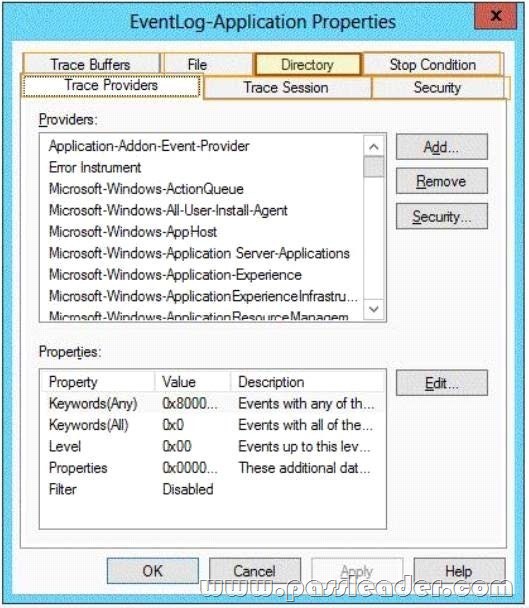
Answer: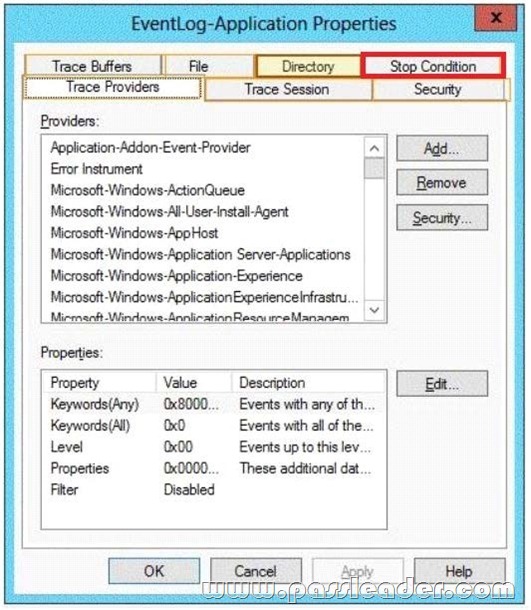
QUESTION 122
Your network contains an Active Directory domain named contoso.com. The domain contains a member server named Server1. All servers run Windows Server 2012 R2. You need to collect the error events from all of the servers on Server1. The solution must ensure that when new servers are added to the domain, their error events are collected automatically on Server1. Which two actions should you perform? (Each correct answer presents part of the solution. Choose two.)
A. On Server1, create a collector initiated subscription.
B. On Server1, create a source computer initiated subscription.
C. From a Group Policy object (GPO), configure the Configure target Subscription Manager setting.
D. From a Group Policy object (GPO), configure the Configure forwarder resource usage setting.
Answer: BC
QUESTION 123
You have Windows Server 2012 R2 installation media that contains a file named Install.wim. You need to identify which images are present in Install.wim. What should you do?
A. Run imagex.exe and specify the/verify parameter.
B. Run imagex.exe and specify the /ref parameter.
C. Run dism.exe and specify the /get-mountedwiminfo parameter.
D. Run dism.exe and specify the /get-imageinfo parameter.
Answer: D
QUESTION 124
Your network contains an Active Directory domain named contoso.com. The domain contains a member server that runs Windows Server 2012 R2 and has the Windows Deployment Services (WDS) server role installed. You create a new multicast session in WDS and connect 50 client computers to the session. When you open the Windows Deployment Services console, you discover that all of the computers are listed as pending devices. You need to ensure that any of the computers on the network can join a multicast transmission without requiring administrator approval. What should you configure? To answer, select the appropriate tab in the answer area.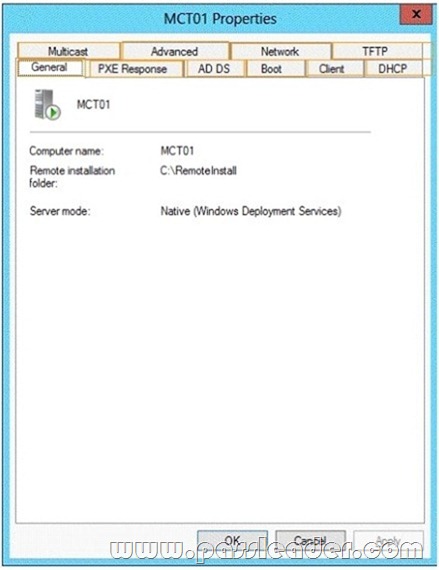
Answer: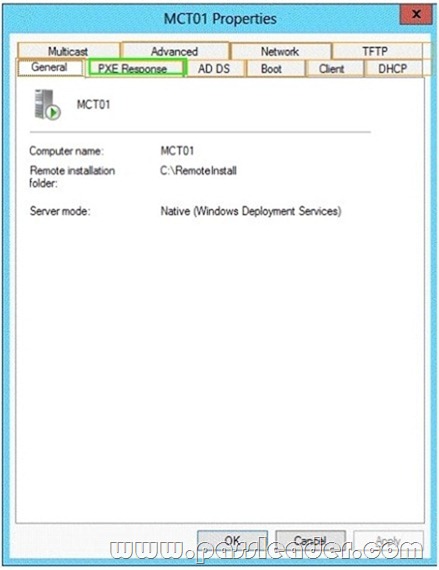
QUESTION 125
Your network contains an Active Directory domain named contoso.com. The domain contains two member servers named Server1 and Server2. All servers run Windows Server 2012 R2. Server1 and Server2 are nodes in a Hyper-V cluster named Cluster1. Cluster1 hosts 10 virtual machines. All of the virtual machines run Windows Server 2012 R2 and are members of the domain. You need to ensure that the first time a service named Service1 fails on a virtual machine, the virtual machine is moved to a different node. You configure Service1 to be monitored from Failover Cluster Manager. What should you configure on the virtual machine?
A. From the Recovery settings of Service1, set the First failure recovery action to Restart the Service.
B. From the General settings, modify the Service status.
C. From the Recovery settings of Service1, set the First failure recovery action to Take No Action.
D. From the General settings, modify the Startup type.
Answer: C
QUESTION 126
Your network contains two servers named Server1 and Server2 that run Windows Server 2012 R2. Server1 and Server2 have the Windows Server Update Services server role installed. Server1 synchronizes from Microsoft Update. Server2 is a Windows Server Update Services (WSUS) replica of Server1. You need to configure replica downstream servers to send Server1 summary information about the computer update status. What should you do?
A. From Server1, configure Reporting Rollup.
B. From Server2, configure Reporting Rollup.
C. From Server1, configure Email Notifications.
D. From Server2, configure Email Notifications.
Answer: A
QUESTION 127
Drag and Drop Question
Your network contains an Active Directory domain named contoso.com. The domain contains two member servers named Server1 and Server2. All servers run Windows Server 2012 R2. You generalize Server2. You install the Windows Deployment Services (WDS) server role on Server1. You need to capture an image of Server2 on Server1. Which three actions should you perform? To answer, move the three appropriate actions from the list of actions to the answer area and arrange them in the correct order.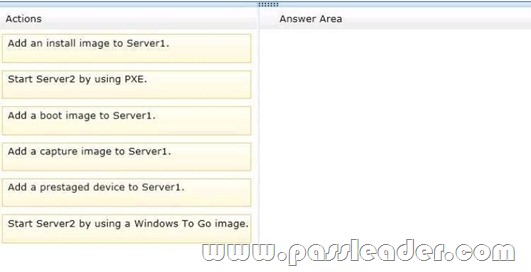
Answer: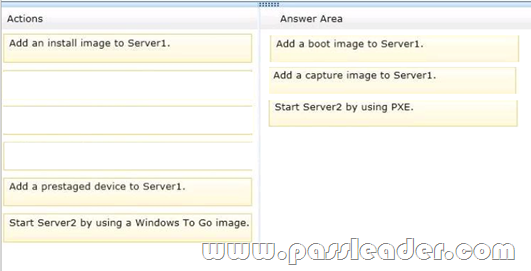
QUESTION 128
Your network contains an Active Directory domain named adatum.com. Client computers are deployed by using Windows Deployment Services (WDS). From Active Directory Users and Computers on a domain controller named DO, you attempt to create a new computer account as shown in the exhibit. (Click the Exhibit button.) You need to ensure that you configure computer accounts as managed accounts when you create the computer accounts from Active Directory Users and Computers. What should you do on DC1?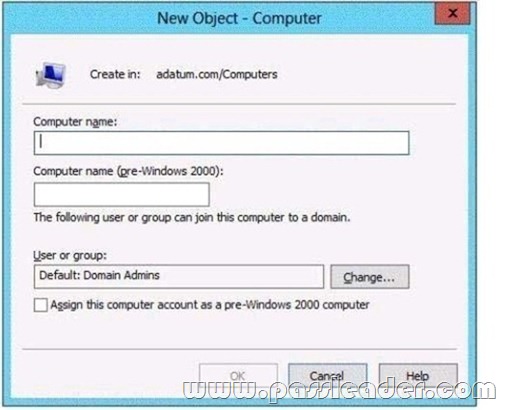
A. Install the User Interfaces and Infrastructure feature.
B. From the View menu in Active Directory Users and Computers, select Users, Contacts, Groups, and Computers as containers.
C. Install the Windows Deployment Services Tools role administration tool.
D. From the View menu in Active Directory Users and Computers, select Advanced Features.
Answer: C
QUESTION 129
You have a server named Server1 that runs Windows Server 2012 R2. On Server1, you configure a custom Data Collector Set (DCS) named DCS1. You need to ensure that all performance log data that is older than 30 days is deleted automatically. What should you configure?
A. a File Server Resource Manager (FSRM) quota on the %Systemdrive%\PerfLogs folder
B. a schedule for DCS1
C. the Data Manager settings of DCS1
D. a File Server Resource Manager (FSRM) file screen on the %Systemdrive%\PerfLogs folder
Answer: C
QUESTION 130
You have a server named Server1 that runs Windows Server 2012 R2. You create a custom Data Collector Set (DCS) named DCS1. You need to configure DCS1 to meet the following requirements:
– Automatically run a program when the amount of total free disk space on Server1 drops below 10 percent of capacity.
– Log the current values of several registry settings.
Which two should you configure in DCS1? (Each correct answer presents part of the solution. Choose two.)
A. Configure a configuration data collector.
B. A performance counter
C. Event trace data
D. A Performance Counter Alert
Answer: AD
QUESTION 131
Your network contains an Active Directory domain named contoso.com. All domain controllers run Windows Server 2012 R2. An organizational unit (OU) named OU1 contains 200 client computers that run Windows 8 Enterprise. A Group Policy object (GPO) named GPO1 is linked to OU1. You make a change to GPO1. You need to force all of the computers in OU1 to refresh their Group Policy settings immediately. The solution must minimize administrative effort. Which tool should you use?
A. The Set-AdComputercmdlet
B. Group Policy Object Editor
C. Active Directory Users and Computers
D. Group Policy Management Console (GPMC)
Answer: D
QUESTION 132
Your network contains an Active Directory domain named contoso.com. All client computers connect to the Internet by using a server that has Microsoft Forefront Threat Management Gateway (TMG) installed. You deploy a server named Server1 that runs Windows Server 2012 R2. You install the Windows Server Update Services server role on Server1. From the Windows Server Update Services Configuration Wizard, you click Start Connecting and you receive an HTTP error message. You need to configure Server1 to download Windows updates from the Internet. What should you do?
A. From the Update Services console, modify the Synchronization Schedule options.
B. From Windows Internet Explorer, modify the Connections settings.
C. From Windows Internet Explorer, modify the Security settings.
D. From the Update Services console, modify the Update Source and Proxy Server options.
Answer: D
QUESTION 133
Your network contains a single Active Directory domain named contoso.com. The domain contains a member server named Server1 that runs Windows Server 2012 R2. Server1 has the Windows Server Updates Services server role installed and is configured to download updates from the Microsoft Update servers. You need to ensure that Server1 downloads express installation files from the Microsoft Update servers. What should you do from the Update Services console?
A. From the Automatic Approvals options, configure the Update Rules settings.
B. From the Products and Classifications options, configure the Classifications settings.
C. From the Products and Classifications options, configure the Products settings.
D. From the Update Files and Languages options, configure the Update Files settings.
Answer: D
QUESTION 134
You have a VHD that contains an image of Windows Server 2012 R2. You plan to apply updates to the image. You need to ensure that only updates that can install without requiring a restart are installed. Which DISM option should you use?
A. /PreventPending
B. /Apply-Unattend
C. /Cleanup-Image
D. /Add-ProvisionedAppxPackage
Answer: A
QUESTION 135
Your network contains an Active Directory domain named adatum.com. The domain contains a server named WDS1 that runs Windows Server 2012 R2. You install the Windows Deployment Services server role on WDS1. You have a virtual machine named VM1 that runs Windows Server 2012 R2. VM1 has several line-of-business applications installed. You need to create an image of VM1 by using Windows Deployment Services. Which type of image should you add to VM1 first?
A. Capture
B. Install
C. Discovery
D. Boot
Answer: D
QUESTION 136
You have a server named Server1 that runs Windows Server 2012 R2. Server1 has the Windows Server Update Services server role installed. You need to configure Windows Server Update Services (WSUS) to support Secure Sockets Layer (SSL). Which three actions should you perform? (Each correct answer presents part of the solution. Choose three.)
A. Run the wsusutil.exe command.
B. From Internet Information Services (IIS) Manager, modify the bindings of the WSUS website.
C. From Internet Information Services (IIS) Manager, modify the connection strings of the WSUS website.
D. Run the iisreset.exe command.
E. Install a server certificate.
Answer: ABE
QUESTION 137
Your network contains an Active Directory domain named contoso.com. The domain contains a server named Server1 that runs Windows Server 2012 R2. Server1 has the Windows Server Update Services server role installed. You have a Group Policy object (GPO) that configures the Windows Update settings. You need to modify the GPO to configure all client computers to install Windows updates every Wednesday at 01:00. Which setting should you configure in the GPO? To answer, select the appropriate setting in the answer area.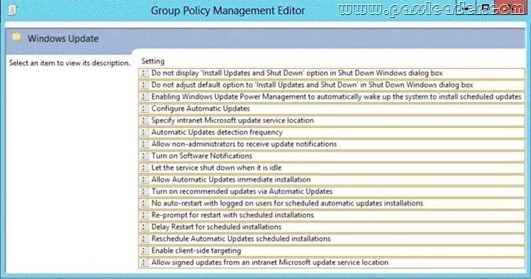
Answer: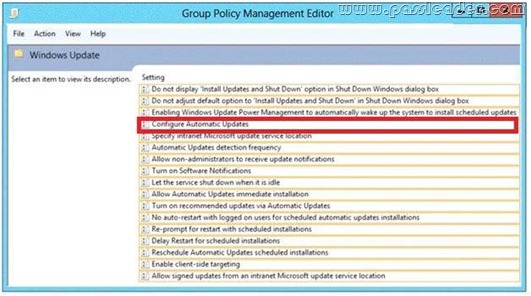
QUESTION 138
You have a server named Server1 that runs Windows Server 2012 R2. You need to configure Server1 to create an entry in an event log when the processor usage exceeds 60 percent. Which type of data collector should you create?
A. an event trace data collector
B. a performance counter data collector
C. a performance counter alert
D. a configuration data collector
Answer: C
QUESTION 139
You have a VHD that contains an image of Windows Server 2012 R2. You need to apply an update package to the image. Which DISM option should you use?
A. /Add-ProvisionedAppxPackage
B. /Cleanup-Image
C. /Add-Package
D. /Apply-Unattend
Answer: C
QUESTION 140
Your network contains an Active Directory domain named contoso.com. The domain contains a server named Server1 that runs Windows Server 2012 R2 and a server named Server2 that has the File Services server role installed. You install the Windows Deployment Services server role on Server1. You plan to use Server2 as a reference computer. You need to create an image of Server2 by using Windows Deployment Services. Which type of image should you add to Server1 first?
A. Boot
B. Discovery
C. Install
D. Capture
Answer: A
QUESTION 141
You have a server named Server1 that runs Windows Server 2012 R2. Server1 has the Windows Server Update Services roll installed. Server1 stores update files locally in C:\Updates. You need to change the location in which the updates files are stored to D:\Updates. What should you do?
A. From the Update Services Console, run the Windows Server Update Services Configuration Wizard
B. From the command prompt, run wsusutil.exe and specify the movecontent parameter
C. From the command prompt, run wsusutil.exe and specify the export parameter
D. From the Update Services Console, configure the update Files and Languages option
Answer: B
QUESTION 142
You have Site1 with 400 desktops and Site2 with 150 desktops. You have a WSUS Server to deploy updates for both sites. You need to make sure that all computers in the same site will have the same updates. What should you configure?
A. Computer Groups
B. Security Groups
C. Synchronization Options
D. Classifications
Answer: A
QUESTION 143
You have a WDS server named Server1 on Windows Server 2012 R2. You need to automate the WDS deployment. Which Tab should you configure?
A. Boot Properties
B. Client Properties
C. Network Settings
D. PXE Response Settings
Answer: B
QUESTION 144
Which parameter do you need to use to import GUID and MAC address?
A. /get-AutoAddDevices
B. /get-Device
C. /add
D. /enable
Answer: B
QUESTION 145
Your network contains an Active Directory domain named contoso.com. The domain contains a member server named Server1. Server1 runs Windows Server 2012 and has the Windows Deployment Services (WDS) server role installed. You need to use WDS to deploy an image to a client computer that does not support PXE. Which type of image should you use to start the computer?
A. boot
B. install
C. discovery
D. capture
Answer: C
QUESTION 146
Your network contains an Active Directory forest named adatum.com. All servers run Windows Server 2012 R2. The domain contains four servers. The servers are configured as shown in the following table.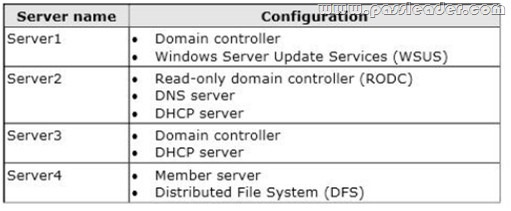
You need to deploy IP Address Management (IPAM) to manage DNS and DHCP. On which server should you install IPAM?
A. Server1
B. Server2
C. Server3
D. Server4
Answer: D
QUESTION 147
Your company deploys a new Active Directory forest named contoso.com. The first domain controller in the forest runs Windows Server 2012 R2. The forest contains a domain controller named DC10. On DC10; the disk that contains the SYSVOL folder fails. You replace the failed disk. You stop the Distributed File System (DFS) Replication service. You restore the SYSVOL folder. You need to perform a non-authoritative synchronization of SYSVOL on DC10. Which tool should you use before you start the DFS Replication service on DC10?
A. Dfsgui. msc
B. Dfsmgmt. msc
C. Adsiedit. msc
D. Ldp
Answer: C
QUESTION 148
Your network contains an Active Directory domain named contoso.com. The domain contains a server named Server1 that runs Windows Server 2008 R2. You plan to test Windows Server 2012 R2 by using native-boot virtual hard disks (VHDs). You attach a new VHD to Server1. You need to install Windows Server 2102 R2 in the VHD. What should you do?
A. Run dism.exe and specify the /apply-image parameter.
B. Run dism.exe and specify the /append-image parameter.
C. Run imagex.exe and specify the /export parameter.
D. Run imagex.exe and specify the /append parameter.
Answer: A
QUESTION 149
You have a server named Admin1 that runs Windows Server 2012 R2. On Admin1, you configure a custom Data Collector Set (DCS) named DCS1. DCS1 is configured to store performance log data in C:\Logs. You need to ensure that the contents of C:\Logs are deleted automatically when the folder reaches 100 MB in size. What should you configure?
A. A File Server Resource Manager (FSRM) quota on the C:\Logs folder
B. A File Server Resource Manager (FSRM) file screen on the C:\Logs folder
C. A schedule for DCS1
D. The Data Manager settings of DCS1
Answer: D
QUESTION 150
Your network contains an Active Directory domain named contoso.com. All domain controllers run Windows Server 2012 R2. The domain contains 500 client computers that run Windows 8.1 Enterprise and Microsoft Office 2013. You implement a Group Policy central store. You need to modify the default Microsoft Office 2013 Save As location for all client computers. The solution must minimize administrative effort. What should you configure in a Group Policy object (GPO)?
A. The Group Policy preferences
B. An application control policy
C. The Administrative Templates
D. The Software Installation settings
Answer: A
Download Free 70-411 PDF Dumps From Google Drive: https://drive.google.com/open?id=0B-ob6L_QjGLpfnVfbXEwbmlUa1paemdDc19zQ1JWdVpqU1poRlB2TnktaWlBUFhfQXNJZVU (Explanation For Every Question Is Available!)
PassLeader 70-411 VCE Dumps Screenshots:
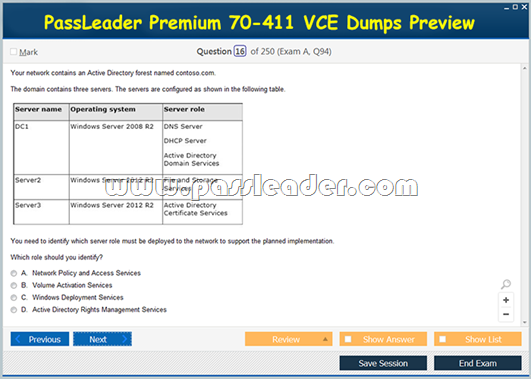
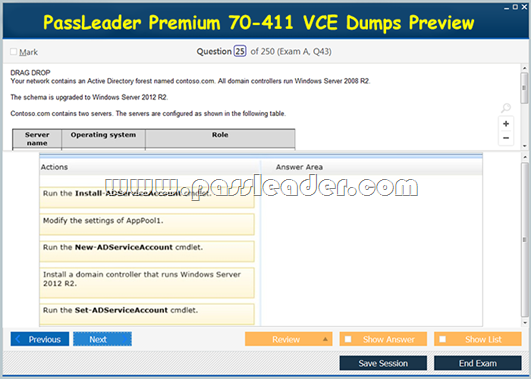
Download New 70-411 VCE Dumps From PassLeader: http://www.passleader.com/70-411.html (New Questions Are 100% Available and Wrong Answers Have Been Corrected!!!)





